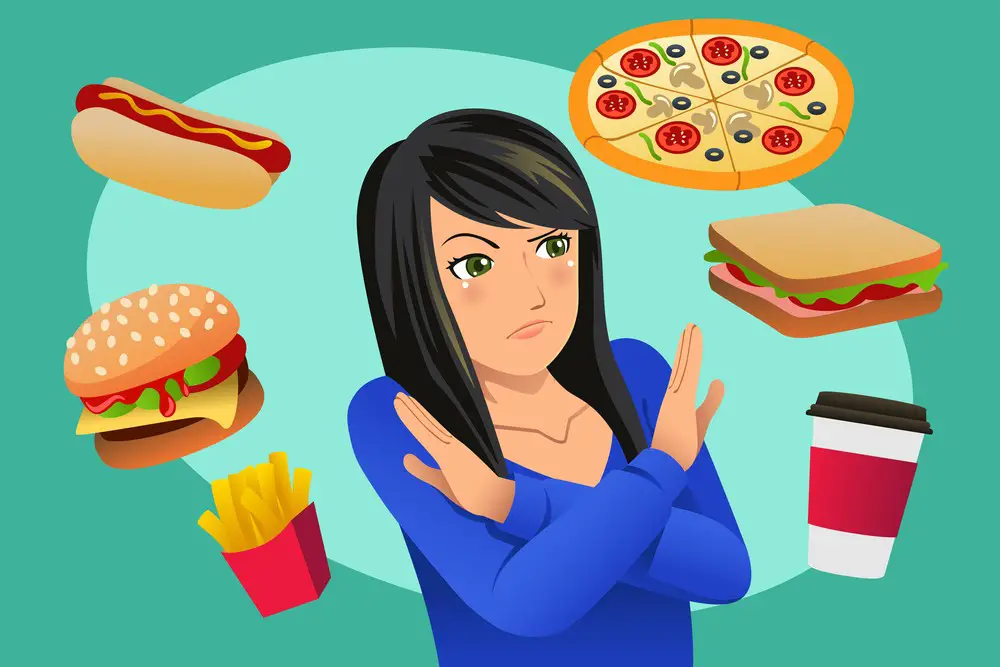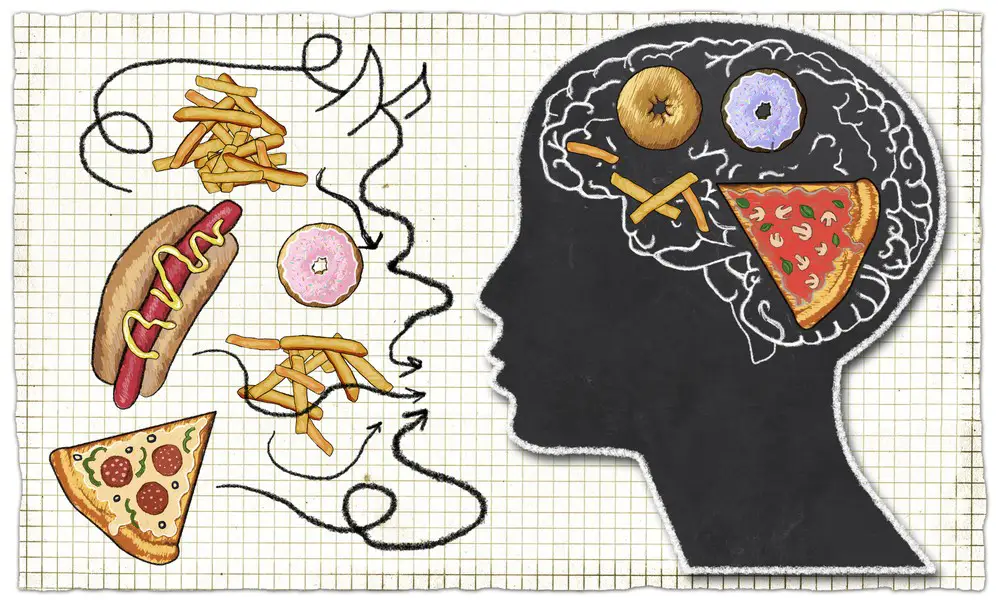As a BetterHelp affiliate, we receive compensation from BetterHelp if you purchase products or services through the links provided
Mental hunger, a commonly misunderstood concept, refers to the persistent thoughts and cravings associated with food. When an individual experiences mental hunger, they may find themselves constantly thinking about food, even when they are not physically hungry. This phenomenon can occur for various reasons, from emotional eating to a response to prolonged periods of energy deficit. Understanding mental hunger is crucial for promoting a healthy relationship with food and managing eating behaviors.
While mental hunger may not always indicate a significant concern, it is essential to distinguish it from physical hunger and be aware of any underlying factors contributing to its development. Some people may experience mental hunger due to emotional or psychological factors, while others may develop it due to nutritional imbalances or social influences. Recognizing the signs of mental hunger and addressing its root causes can help prevent unhealthy eating habits and improve overall mental and physical well-being.
Key Takeaways
- Mental hunger involves persistent thoughts and cravings for food, even when not physically hungry.
- Distinguishing mental hunger from physical hunger is essential for managing eating behaviors.
- Addressing the root causes of mental hunger can promote overall mental and physical well-being.

Understanding Mental Hunger
Definition of Mental Hunger
Mental hunger is a phenomenon where you constantly think about food, even when you’re not physically hungry. This type of hunger doesn’t necessarily mean you want to eat, but you may be preoccupied with food-related thoughts or behaviors. Experiencing mental hunger often indicates that your body requires comfort, soothing, or stress relief rather than nourishment.
Difference Between Physical and Mental Hunger
Here are some key differences between physical and mental hunger to better understand them:
- Source: Physical hunger stems from the body’s need for energy and nutrients, while mental hunger emerges from emotional or psychological triggers, such as stress, boredom, or anxiety.
- Onset: Physical hunger usually occurs gradually, building up over time, whereas mental hunger can strike suddenly and intensely.
- Satiety: When eating in response to physical hunger, you typically feel full and satisfied after consuming appropriate food. On the other hand, mental hunger often persists even after eating a normal meal, leaving you craving more.
- Food choices: Physical hunger can be satisfied by any food that meets your nutritional needs, while mental hunger may result in specific cravings, usually for comfort or indulgent foods.
- Awareness: When eating to satisfy physical hunger, you’re more conscious of what you’re consuming and tend to enjoy the experience. Mental hunger tends to result in mindless eating, making it hard to appreciate the taste and texture of the food fully.
To better manage mental and physical hunger, you must recognize the signals your body sends you and learn how to respond appropriately. Listen to your body, practice mindful eating, and seek healthier ways to cope with emotional triggers. This will help you maintain a balanced relationship with food and promote overall well-being.
 Effects of Mental Hunger
Effects of Mental Hunger
On Emotional Well-being
When experiencing mental hunger, your emotional well-being can be significantly affected. This type of hunger often comes from stress, anxiety, or emotional turmoil, which can lead to emotional eating. This emotional eating does not satisfy psychological needs and can exacerbate guilt and shame. In this cycle, it’s common for you to:
- Crave foods high in sugar, fat, or salt to comfort your emotions
- Feel increasingly irritable or moody
- Experience heightened anxiety
During mental hunger, taking care of your emotional needs and practicing self-care is essential.
On Physical Health
Mental hunger can also impact your physical health. The stress associated with emotional eating can lead to:
- Sleep problems, such as insomnia or poor-quality sleep
- Increased risk for chronic health conditions like heart disease, diabetes, and obesity
It’s important to recognize the connection between mental hunger and physical health and strive to make healthier decisions when confronted with emotional eating urges.
On Relationships
Your relationships can also be affected by mental hunger. The emotional turmoil and stress you experience may lead to:
- Strained relationships with family and friends
- Difficulty concentrating at work
- A potential impact on your ability to connect with your partner
Effective coping strategies such as mindful eating and stress management techniques can help improve your relationships and decrease the negative impact of mental hunger.
Key takeaway: Understanding the effects of mental hunger on your emotional well-being, physical health, and relationships is vital to making informed decisions about managing it and minimizing any negative consequences.
Recognizing Mental Hunger
Hunger Signals
To identify mental hunger, it’s essential to understand the difference between true physical hunger and emotional hunger. Physical hunger usually has gradual onset and is satisfied once we eat. Feeling hungry at regular mealtimes is normal. However, mental hunger comes on suddenly and can persist even after eating. A few ways to recognize mental hunger are:
- Craving specific comfort foods.
- Desire to eat even when not physically hungry.
- Eating to soothe emotions, such as stress or sadness.
Remember to check in with yourself when you feel hungry. Are you physically hungry, or is an underlying emotion driving your cravings?
Emotional Triggers
Emotional triggers can cause mental hunger, leading to emotional eating. It’s crucial to identify these triggers to manage your mental hunger appropriately. Some common emotional triggers include:
- Stress: When stressed, our body releases cortisol, which can increase appetite and lead to cravings for sugary or fatty foods.
- Boredom: In moments of inactivity or lack of stimulation, we may turn to food for entertainment.
- Sadness or loneliness: Eating can provide temporary comfort, making us turn to food when feeling down or isolated.
You can better differentiate between mental and genuine physical hunger by recognizing your emotional triggers and hunger signals. This awareness is the first step to making healthier choices and managing your relationship with food.
Eating Disorders and Mental Hunger
Anorexia and Mental Hunger
Anorexia nervosa is an eating disorder characterized by an intense fear of gaining weight and a distorted body image. Mental hunger is a common aspect experienced by those struggling with this disorder. Your body may send cues to eat, but your fear of gaining weight may push you to ignore these signals.
To cope with mental hunger due to anorexia, consider the following:
- Recognize that mental hunger is your body’s way of communicating its needs.
- Challenge the distorted thoughts about food, eating, and weight.
- Consult a therapist or counselor to help you develop healthier eating patterns and address the underlying issues.
Emotional Eating and Mental Hunger
Emotional eating is another aspect of mental hunger, where you may consume large quantities of food in response to negative emotions and stress. This often leads to overeating and can exacerbate unhealthy eating patterns.
Here are some strategies to manage emotional eating related to mental hunger:
- Identify your emotional triggers, such as stress, sadness, or boredom.
- Develop alternative coping mechanisms, like engaging in physical activity or practicing mindfulness to reduce stress.
- Incorporate regular mealtimes and avoid restricting or skipping meals, which can contribute to overeating later.
Remember that seeking help from a mental health professional may be beneficial in addressing both anorexia and emotional eating. They can provide guidance and support as you develop a healthier relationship with food and body image.
 Nutritional Perspectives on Mental Hunger
Nutritional Perspectives on Mental Hunger
Energy Level and Mental Hunger
Your energy levels play a significant role in your mental hunger. When your body lacks the necessary nutrients, it may trigger mental cravings to compensate for this deficiency. Consuming meals with a balance of carbohydrates, protein, and healthy fats not only provides your body with the energy it needs but also helps maintain a stable mood and reduce mental hunger. Aim for the following key points:
- Eat small, frequent meals to maintain energy levels and mental clarity
- Choose nutrient-dense food options to fuel your body
Balanced Diet and Mental Hunger
A well-rounded, balanced diet is essential for managing mental hunger. Ensuring your meals consist of whole foods, healthy fats, lean protein, and various fruits and vegetables can help decrease mental cravings. Here are some suggestions on how to achieve a balanced diet:
- Plan your meals: Include a variety of foods from each food group
- Know your macronutrients: Be aware of the proper balance of protein, carbohydrates, and fats in your diet
- Stay hydrated: Drink enough water to support digestion and overall mental well-being
Processed Foods and Mental Hunger
Too many processed or sugary foods in your diet may contribute to mental hunger. These foods cause rapid changes in blood sugar levels, which may lead to mood swings and increased cravings. Limiting your intake of processed foods and opting for whole, nutrient-dense options can keep your mental hunger in check. Focus on these healthier choices:
- Limit sugary snacks and drinks.
- Choose whole grains over refined options
- Include plenty of colorful fruits and vegetables
Addressing Mental Hunger
Health Care Aid
To address mental hunger, seeking professional health care support is essential. Mental health professionals can help you identify the root causes of your mental hunger and develop coping strategies. Some common techniques to address mental hunger in a healthcare setting are:
- Mindfulness and meditation: Practicing mindfulness and meditation can help you become more aware of your thoughts and emotions related to food and hunger.
- Cognitive Behavioral Therapy (CBT): CBT helps you identify, challenge, and replace negative thoughts and behaviors around food and eating habits.
- Nutritional counseling: A registered dietitian can provide support and guidance on incorporating nutrient-dense foods in your diet to manage mental hunger.
Communication and Mental Hunger
In addition to seeking professional support, open communication is key to managing your mental hunger. Discuss your feelings and experiences with trusted friends or family to help build a supportive environment. Some tips for effective communication include:
- Express your emotions honestly and openly.
- Be an active listener, giving others your full attention when they share their experiences.
- Practice empathy to understand and validate others’ feelings.
- Encourage feedback and be open to new ideas and suggestions.
Food and Mental Hunger
Making dietary adjustments can help alleviate mental hunger. By focusing on nutrient-rich foods, you can ensure that both your physical and mental needs are met. Here are some suggested foods to incorporate in your diet:
- Leafy greens: Spinach, kale, and other vegetables provide essential vitamins and minerals supporting brain functioning.
- Fruits: Fresh fruits like berries, apples, and oranges are packed with beneficial nutrients and antioxidants for overall mental health.
- Legumes: Beans, chickpeas, and lentils are excellent sources of protein and fiber that promote satiety and provide long-lasting energy.
- Fish: Omega-3 fatty acids found in fish, such as salmon and mackerel, help maintain brain health and reduce inflammation.
- Whole grains: Foods like brown rice, quinoa, and whole wheat bread provide essential vitamins, minerals, and fiber that help manage mental hunger.
- Nuts: Almonds, walnuts, and other nuts are packed with healthy fats and nutrients that support brain function.
By incorporating these nutrient-dense foods, you can better manage your mental hunger and support overall mental well-being. Additionally, prioritizing regular meals and snacks can help you avoid eating junk food when your mental hunger strikes. As always, consult a healthcare professional before making any drastic dietary changes.
Social Factors Influencing Mental Hunger
Food Insecurity and Mental Hunger
Food insecurity can be a significant factor that influences mental hunger. When you experience a constant lack of access to affordable and nutritious food, it can lead to increased stress and anxiety. This can be particularly damaging for children, who rely on a stable food supply for their growth and well-being. Food insecurity can contribute to developmental delays and affect school performance.
Feeding America is an organization that actively works to combat food insecurity in the United States. Providing resources and support to food banks, they help address the issue at a community level.
Poverty and Mental Hunger
Poverty is another social factor that plays a role in mental hunger. You and your family may struggle to afford a consistent supply of healthy food, leading to a cycle of hunger and mental distress. This burden can be especially hard on children, who may experience lower academic achievements and poor mental health as a result.
- Addressing poverty requires a multi-faceted approach that could include societal initiatives and government policies to create more equitable education, employment, and healthcare opportunities.
Food Banks and Mental Hunger
Food banks are a vital resource in the fight against hunger and mental distress. They support those in need by distributing donated food to individuals and families facing food insecurity. This assistance can help alleviate some of the mental strain of hunger.
However, food banks alone may not be enough to address the root causes of mental hunger. Schools, communities, and government agencies must work together to tackle poverty, food insecurity, and other related factors.
Your continued support of food banks and advocacy for addressing the larger social issues surrounding poverty and food insecurity can significantly combat mental hunger and its adverse effects on individuals and communities.
Frequently Asked Questions

What causes mental hunger?
Mental hunger occurs when you think about food, often resulting from an extended period of energy deficit. Emotional factors, such as stress, boredom, or habit, can also trigger it. Social and environmental factors, like food marketing and cultural preferences, can also contribute to mental hunger.
Key takeaway: Mental hunger can be caused by physical, emotional, and environmental factors.
How can I distinguish between physical and mental hunger?
To tell the difference between physical and mental hunger, consider the following:
- Physical hunger usually comes on gradually and can be satisfied with any food. You might experience sensations like stomach growling or low energy.
- Mental hunger tends to be sudden and craving-specific. It is often influenced by thoughts, emotions, or external cues like seeing or smelling food.
Key takeaway: Physical hunger is gradual and satisfied by any food, while mental hunger is sudden and craving-specific.
What are strategies to manage mental hunger?
Here are a few strategies to help manage mental hunger:
- Wait 10-15 minutes before giving in to a craving – it may pass.
- Stay hydrated, as thirst can sometimes be mistaken for hunger.
- Practice mindful eating – focus on the taste and texture of food, and eat slowly.
- Keep a food journal to identify patterns or triggers for mental hunger.
- Engage in activities that distract you from food, like exercise, hobbies, or socializing.
Key takeaway: Use strategies like mindful eating and staying hydrated to manage mental hunger.
How does emotional eating relate to mental hunger?
Emotional eating is the act of consuming food for comfort, stress relief, or to cope with emotions, rather than to satisfy physical hunger. Mental hunger is often linked to emotional eating, as both are driven by thoughts and feelings rather than physical needs. Identifying and addressing the source of emotional eating can help manage mental hunger.
Key takeaway: Mental hunger and emotional eating are related, as both are influenced by emotions and thoughts rather than physical needs.
Can mental hunger lead to overeating?
Yes, mental hunger can lead to overeating, as it might prompt you to consume food when you’re not physically hungry. Unaddressed mental hunger can result in excess calories, potentially contributing to weight gain and an unhealthy relationship with food.
Key takeaway: Mental hunger can lead to overeating if not properly managed.
Does stress contribute to mental hunger?
Stress can contribute to mental hunger, triggering emotional eating or cravings for comfort foods, particularly high-sugar or high-fat foods. Managing stress through exercise, relaxation techniques or seeking professional help can help reduce its impact on mental hunger.
Key takeaway: Stress can contribute to mental hunger by triggering cravings and emotional eating.
About Jacob Maslow
After surviving the traumatizing events of 9/11, I took it upon myself to heal through helping others. I’m the primary caregiver of my children and understand from first-hand experience the lonely paths you have to walk as a partner and parent when leaving an unhealthy relationship.
We’re all echoing in a dark space that doesn’t have to be this empty, and that’s been my mission since finding solace and recovery in therapy: To help comfort others who are still in shock and at the prime of their struggle.
I came across BetterHelp after searching for this type of community. I wanted to belong to a body of proactive therapists and supportive therapy veterans that allowed me to see other sides of the story.
It was unconventional, and that’s what attracted me most. During my most challenging times, when my ex-wife completely cut me off from my children, I found comfort and clarity through BetterHelp.
Instead of being chained to a strict therapist recommendation, I was in charge of who I felt understood my struggle most. That allowed me to find my true peace, as I was reunited with those who read behind my words and had first-hand experience with my trauma.
Recovery is a choice; with BetterHelp, that choice will be a few clicks away. You can join their couples-oriented platform, Regain.us for those stuck with family estrangement and toxic relationship patterns.
lass="abh_posts">Recent Posts- 7 Ideas to Help You Relax and Unwind on a Family Vacation - April 27, 2025
- How Having Cybersecurity Protection Helps You Relax - April 25, 2025


 Effects of Mental Hunger
Effects of Mental Hunger Nutritional Perspectives on Mental Hunger
Nutritional Perspectives on Mental Hunger
